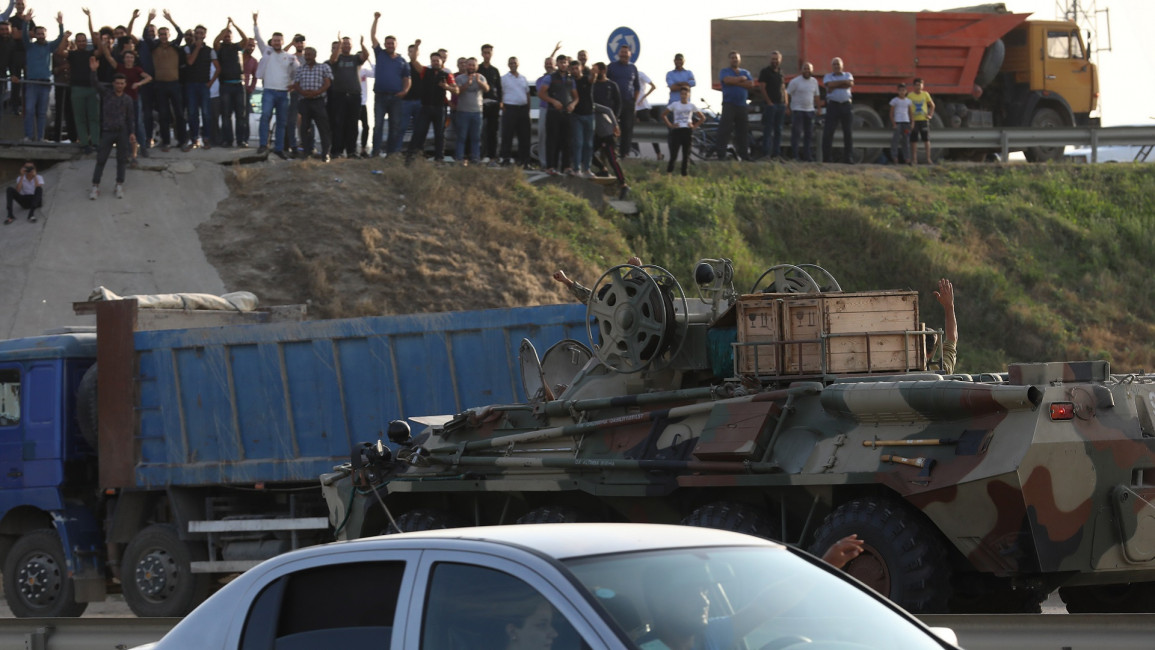Clashes between Azerbaijan and Armenia leave at least 23 dead amid fears of regional conflict
Arch foes Armenia and Azerbaijan on Sunday accused each other of initiating deadly clashes that claimed at least 23 lives over a decades-long territorial dispute and threatened to draw in regional powers Russia and Turkey.
The clashes, the worst since 2016, have raised the spectre of a fresh war between long-standing rivals Azerbaijan and Armenia.
The two countries have been locked for decades in a territorial dispute over the Armenian-backed breakaway region of Nagorny Karabakh.
Read also: Armenia and Azerbaijan - a decades-long and volatile rivalry
Sixteen Armenian separatist fighters were killed and more than 100 wounded in fighting, separatist officials in the region said.
Both sides also reported civilian casualties including at least one Armenian woman and a child. Baku said that an Azerbaijani family of five were killed in shelling launched by Armenian separatists.
A major confrontation between mostly Muslim Azerbaijan and majority Christian Armenia threatened to embroil regional players Moscow and Ankara and Armenian Prime Minister Nikol Pashinyan called on global powers to prevent Turkey from getting involved in the conflict.
"We are on the brink of a full-scale war in the South Caucasus," Pashinyan warned.
Azerbaijan's "authoritarian regime has once again declared war on the Armenian people", he added.
France, Germany and the EU swiftly urged an "immediate ceasefire," while Pope Francis prayed for peace.
Russian President Vladimir Putin discussed the military flareup with Pashinyan and called for "an end to hostilities".
"The Russian side expressed serious concern over the resumption of large-scale clashes," the Kremlin said.
But Azerbaijan's ally Turkey blamed Yerevan for the flare-up and promised Baku its "full support".
"The Turkish people will support our Azerbaijani brothers with all our means as always," Turkish President Recep Tayyip Erdogan tweeted.
Azerbaijan accused Armenian forces of violating a ceasefire, saying it had launched a counter-offensive to "ensure the safety of the population", using tanks, artillery missiles, combat aviation and drones.
Azerbaijan imposed martial law and a curfew in large cities and said it had captured from Armenian rebels a strategic mountain that helps control transport and communications between Yerevan and the Armenian-held enclave.
'Sacred homeland'
In a televised address to the nation earlier on Sunday, Azerbaijan President Ilham Aliyev vowed victory over Armenian forces.
"Our cause is just and we will win," he said, "Karabakh is Azerbaijan".
Both Armenia and Karabakh declared martial law and military mobilisation.
"Get ready to defend our sacred homeland," Pashinyan said on Facebook.
Armenia said that Azerbaijan attacked civilian settlements in Nagorny Karabakh including the main city of the region, Stepanakert.
Pashinyan's wife, Anna Hakobyan, said that she had travelled to a hospital in Stepanakert to be with her Karabakh "brothers and sisters".
Azerbaijan's foreign ministry said there were reports of dead and wounded. "Extensive damage has been inflicted on many homes and civilian infrastructure," it said.
Karabakh's rights ombudsman Artak Beglaryan said there were "civilian casualties," while Armenia announce that a woman and a child had been killed.
Frozen conflict heats up
Ethnic Armenian separatists seized the Nagorny Karabakh region from Baku in a 1990s war that claimed 30,000 lives.
Talks to resolve one of the worst conflicts to emerge from the 1991 collapse of the Soviet Union have been largely stalled since a 1994 ceasefire agreement.
France, Russia and the United States have mediated peace efforts as the "Minsk Group" but the last big push for a peace deal collapsed in 2010.
Pope Francis told crowds on Saint Peter's Square he was praying for peace and called for "concrete gestures of good will and fraternity" from the warring sides.
Political observers said global powers should intensify talks to stop the conflict.
"We are a step away from a large-scale war," Olesya Vartanyan of the International Crisis Group told AFP.
"One of the main reasons for the current escalation is a lack of any proactive international mediation between the sides for weeks," she added.
"War is resuming. Time for Russia, France and US, individually and jointly, to stop it," tweeted Dmitry Trenin, director of the Carnegie Moscow Centre.
Separatists accuse Turkey
The Karabakh separatist leader, Arayik Harutyunyan, accused Ankara of sending mercenaries to Azerbaijan.
On Sunday morning, Azerbaijan started "active bombing" along Karabakh's frontline including civilian targets and in Stepanakert, Karabakh's presidency said.
The rebel defence ministry said its troops shot down four Azerbaijani helicopters and 15 drones, while Baku denied the claim.
In July, heavy clashes along the two countries' shared border - hundreds of kilometres from Karabakh - claimed the lives of at least 17 soldiers from both sides.
Raising the stakes, Azerbaijan at the time threatened to strike Armenia's atomic power station if Yerevan attacked strategic facilities.
During the worst recent clashes in April 2016, around 110 people were killed.
Follow us on Facebook, Twitter and Instagram to stay connected



